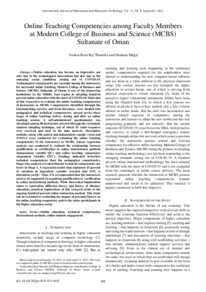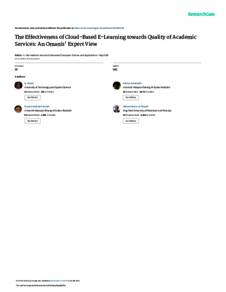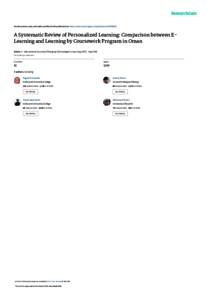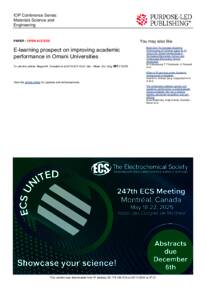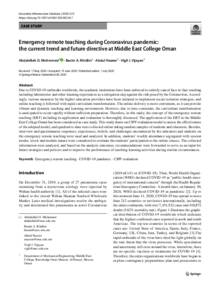وثيقة
Online teaching competencies among faculty members at modern college of business and science (MCBS) Sultanate of Oman.
المعرف
DOI: 10.18178/ijiet.2022.12.9.1692
المصدر
International Journal of Information and Education Technology. v. 12, 9, p. 840-850
المساهمون
Hesham Magd, مؤلف
الدولة
Singapore
مكان النشر
Singapore
الناشر
International Journal of Information and Education Technology.
ميلادي
2022-09-01
اللغة
الأنجليزية
الموضوع
الملخص الإنجليزي
Abstract—Online education has become an imperative not only due to the technological innovations but also due to the emerging social conditions arising out of COVID-19. Technological competencies are essential among the instructors for successful online teaching. Modern College of Business and Science (MCBS), Sultanate of Oman is one of the pioneering institutions in the Middle East region in adopting hundred percent online education with the onset of COVID-19. Main aim of this research is to evaluate the online teaching competencies of instructors at MCBS. Competencies identified through the benchmarking exercise and from literature, were divided into pedagogical and technical competencies, spread across three stages of online teaching: before, during and after an online teaching session. A self-administered questionnaire was circulated among 80 instructors selected through the systematic random sampling technique, out of which 53 valid responses were received and used in the data analysis. Descriptive statistics along with paired and independent sample t tests and ANOVA were conducted for evaluating the online teaching competencies of the instructors at MCBS. Linear regression analysis was conducted to evaluate the relationship between qualification or certification in online instructional methods (independent variable QC) and online teaching competency (dependent variable OTC). Findings indicated lower/less technical competencies than the pedagogical competencies. Stage-wise analysis revealed that the technical competencies are lower in Stage 1. A regression model that explained 43 percent of variation in dependent variable revealed that OTC is dependent on QC. Thus, it is recommended that the instructors need to be supported in acquiring qualification or certification in online instructional methods. While theoretical implications relate to innovation diffusion theory and theory of distance education, practical implications of this research relate to the ongoing hundred percent online instruction method. This study can be extended to evaluating the impact of personal factors on the online teaching competency and to the wider participants in the higher education sector.
ISSN
2010-3689
قالب العنصر
مقالات الدوريات

